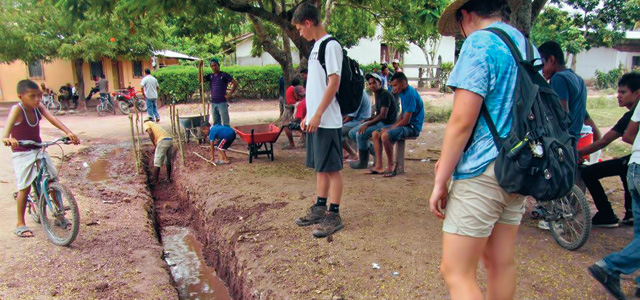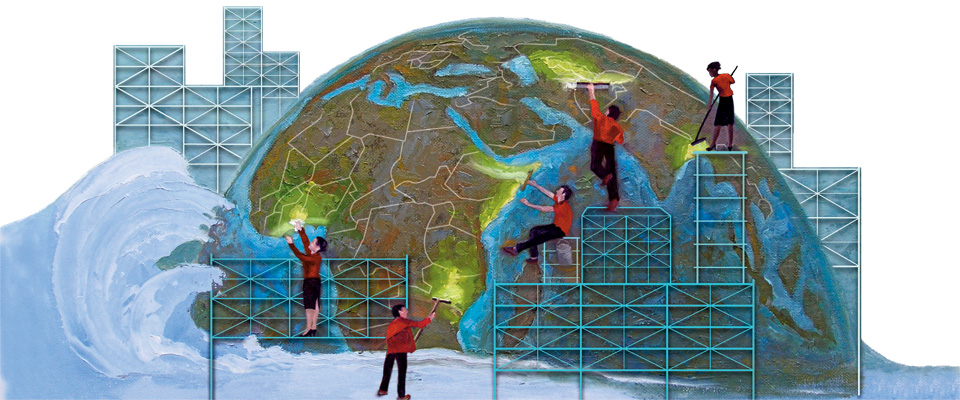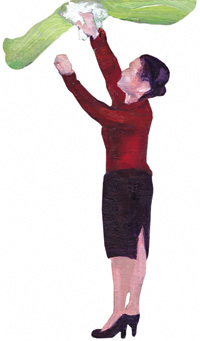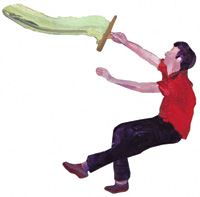
Jul 14, 2014
Community Engagement: Local and Global
The Center for Community Engagement supports and expands experiential learning opportunities through partnerships with communities at the local, national…

by Geoff Gehman ’80 | illustration by Heather Reinert
The three alumni profi led here specialize in global security. One is a research engineer dedicated to improving water and sanitation in Malawi, the African republic.
Another is a UNICEF official committed to educating and protecting children in Uzbekistan, the Asian republic. The third, a communications executive, promotes the trustworthiness of leaders of public companies.
Joe Goodwill ’04 is invested in a Malawi toilet entrepreneur he calls “Mr. C.” The research engineer is developing a battery to generate electricity from latrine compost that Mr. C sells to farmers. Goodwill hopes his microbial fuel cell will tell Mr. C’s cellphone how his toilets are being used and not used, allowing him to run his waste business less wastefully.
 Goodwill built the latrine battery as a member of a team at UMassAmherst, where he’s a doctoral student in civil and environmental engineering. He’s helping Mr. C as a volunteer for Water for People, a nonprofit that helps citizens of poor countries create, maintain, and profit from accessible, reliable systems for water and sanitation. His partnership with Mr. C dovetails with another Water for People project: a community-owned water-users association run by women, the busiest water users in Blantyre, Malawi’s busiest city.
Goodwill built the latrine battery as a member of a team at UMassAmherst, where he’s a doctoral student in civil and environmental engineering. He’s helping Mr. C as a volunteer for Water for People, a nonprofit that helps citizens of poor countries create, maintain, and profit from accessible, reliable systems for water and sanitation. His partnership with Mr. C dovetails with another Water for People project: a community-owned water-users association run by women, the busiest water users in Blantyre, Malawi’s busiest city.
“Mr. C has a keen business sense: He believes he can help himself by helping his community,” says Goodwill. “He’s one of many dedicated folks who know full well their lives are disproportionally challenged by lack of safe, continuous water and sanitation. They don’t need help from charities for change; they want to lift themselves out of poverty.”
Goodwill discovered the beauty of water during family vacations by lakes in the Adirondacks. He discovered the integrity of water during a course with Art Kney, associate professor of civil and environmental engineering. “That’s when I knew I could work with water and be satisfied,” says the civil engineering graduate who minored in environmental studies. “That’s when my education finally made sense.” While helping Kney identify and remove industrial contaminants from Bushkill Creek, Goodwill’s view of water elevated from “an environmental resource with interesting chemistry” to “an essential component of life.”
Water became more essential to Goodwill in 2008, when he made his first trip to Blantyre as an independent auditor. He was surprised to meet people exhausted by walking miles to fetch water unavailable in their villages, and stunned by the many sickened by polluted water. Water-borne diseases, he points out, are one reason why the average Malawi male dies in his 40s.
“In the U.S., water is basically free and always safe and something you don’t have to think about,” says Goodwill, who last year received a $5,000 award from American Water Works Association for his study of ferrate, a potent water oxidant and disinfectant. “In Malawi not having safe drinking water or safe sanitation is something you always have to think about. It permeates life.”
Goodwill says that improving water chemistry will improve human chemistry.
In 2009 Goodwill began helping people in West Bengal, India, worry less about water polluted by arsenic. He predicted filter success based on everything from number of water users to money for maintenance. He recommended smaller filters for lower levels of arsenic, larger filters for smaller numbers of filter-cleaning volunteers.
Goodwill insists that improving water chemistry can improve human chemistry. A well-respected community group devoted to removing arsenic can soften the stigma of arsenic poisoning in West Bengal, where infected children can’t play with noninfected kids, and infected single women can’t marry.
Last November Goodwill ran the New York City Marathon, helping raise over $15,000 for Water for People. He also raised awareness of the marathon distances billions travel for safe water and sanitation.
Goodwill praises Water for People’s new partnership with TOMS, which provides a new pair of shoes for a child in need for every pair of shoes purchased and helps restore eyesight to a person in need for every pair of eyeglasses purchased. In March TOMS pledged to donate proceeds from the sale of TOMS coffee, its newest product, to provide clean water in Honduras, Rwanda, and other coffee-harvesting countries where an estimated 1.8 billion lack safe water.
Trustworthiness is a quality Barbara Brooks Kimmel ’78 champions as founding executive director of Trust Across America-Trust Around the World. She heads an alliance of leadership experts who salute bosses of public companies who salute employees, customers, and healthy bottom lines. Her teammates use a wide range of outlets—workshops, YouTube, radio—to encourage profit-obsessed CEOs to concentrate less on short-term bonuses and more on long-term benefits.
 Kimmel gets her educational, ethical streak from a family of teachers, including a retired principal father. She also was influenced by the late Bill Lawson, legendary coach of lacrosse and swimming. Impressed by her drive, he asked her to start a women’s diving team, even though she wasn’t much of a diver.
Kimmel gets her educational, ethical streak from a family of teachers, including a retired principal father. She also was influenced by the late Bill Lawson, legendary coach of lacrosse and swimming. Impressed by her drive, he asked her to start a women’s diving team, even though she wasn’t much of a diver.
Lawson “was a real stickler for good character,” says Kimmel, an international affairs graduate and mother of Dan Kimmel ’16. “He’d say: ‘You think I didn’t see you with that cigarette? What were you thinking? Not on my swim team.’ He had that old command-andcontrol mentality, but it wasn’t threatening. He was really everybody’s parent away from home.”
For two decades Kimmel worked as a corporate-relocation specialist and a management consultant. In 1995 she became a motivational entrepreneur by launching Next Decade Inc., a communications firm that publishes provocative books about popular subjects. Titles range from Immigration Made Simple to The Hysterectomy Hoax.
For Kimmel, the 2008 global financial crisis was a black widow’s web of hoaxes. She was outraged by federal bailouts for banks that ruined lives with rigged-to- fail mortgages and foreclosures. She was even more outraged by the banks’ outrageous legal fees and CEO bonuses.
The next year Kimmel started Trust Across America to reduce corporate cheating and cover-ups. Her alliance of leadership authorities created a way of measuring the unmeasurable, rating trustworthiness according to five factors—financial stability, accounting conservativeness, corporate integrity, transparency, and sustainability. They use this model to compile annual lists of trustworthy companies like Hormel Foods and thought leaders like Starbucks CEO Howard Schultz.
Trust is hard to define, much harder to implement. Kimmel admits that her advice has been rejected by CEOs preoccupied by daily crises, quarterly profits, and yearly bonuses. This year an insurance executive told her she couldn’t understand the pressures of running a public company because she had never worked for one.
Kimmel has a wide range of weapons to convert the skeptical. She relies on retired CEOs, who have inside information and impressive powers of persuasion.
Kimmel emphasizes praise over criticism. “We celebrate the good guys,” she says. “We never call out the bad guys.” Her organization is self-funded to avoid conflicts of interest.
Numbers may be Kimmel’s best tools. Trust Across America’s top 10 leaders are more stable, staying at the helm an average of 9.8 years, or twice as long as off-the-list leaders. The organization’s top 100 companies earned 38 percent higher dividends than the Standard & Poor 500 from August 2012 to February 2014.
“Trust is not something that has to be forgone for profitability,” says Kimmel. “In fact, it’s quite the opposite: a more trustworthy CEO can make a company more profitable over a longer period of time.”
 Over the last two years Kimmel’s campaign has become more profitable. During this period she added an international division, appeared on Good Business International’s list of 25 world-changing women, and received a social-justice book award for editing Trust Inc.: Strategies for Building Your Company’s Most Valuable Asset.
Over the last two years Kimmel’s campaign has become more profitable. During this period she added an international division, appeared on Good Business International’s list of 25 world-changing women, and received a social-justice book award for editing Trust Inc.: Strategies for Building Your Company’s Most Valuable Asset.
“We are building a movement to help build trust,” says Kimmel. “Trust is a long-term strategy that requires vigilant monitoring. It’s based on character. At the end of the day it all comes down to integrity and keeping your word.”
Robert Fuderich ’76 sat with a dozen teens in an HIV/ AIDS support center in Tashkent, Uzbekistan, where he is based as UNICEF’s country representative. He asked the adolescents what they wanted to be as adults. Each one responded with a lofty job: doctor, teacher, swimmer.
Fuderich wanted to cry. He was moved that the infected teens weren’t infected by despair. Yet he knew their optimism would probably be eroded in a country with severe deficiencies in medication, nutrition, and tolerance. HIV/AIDS carriers in Uzbekistan are often punished as immoral drug addicts and criminal sex offenders, even if they were infected, as most of the adolescents were, by dirty hospital needles.
It was a typically tough situation for Fuderich, who over five decades has protected Bosnian children from snipers, Sudanese children from polluted water, and Jamaican children from adult prisons. “Everywhere you go there are so many challenges, and so many of them are gut-wrenching,” he says. “There are times when you get into an existential despair, when you wonder: Are we making progress? Are we doing the right thing?”
Fuderich began helping foreign children as a child. He was 6 when a local newspaper photographed him in a Halloween costume trick-or-treating for UNICEF. A child of teachers, he entered Lafayette hoping to become a pediatric heart surgeon. Wiser advisers convinced him to switch his major from biology to history, his calling from healing youngsters to improving their welfare. He was mentored by education teacher Robert Pearson, a former Peace Corps worker in Afghanistan. He was empowered by the movie Conrack, in which a privileged white teacher is taught by poor black students on a remote island in the rural South.
Fuderich started his career in the South, counseling runaway adolescents in an Alabama shelter. It was during his second job that he encountered his first international epidemic. As a Peace Corps English instructor in Nepal he was exposed to children dying from chronic diarrhea. A 1981-83 stint in Thailand established Fuderich as a one-man United Nations. He monitored rice distribution for Cambodian refugees. He helped build a youth center with basketball courts. Hepatitis ended his plan to become a monk. So did marriage to a Cambodian, another child of teachers.
Fuderich traveled from country to country, problem to problem. In Pakistan he helped train teachers to home school female refugees from Afghanistan, where girls are blinded with acid for seeking formal education. In the former Yugoslavia, the homeland of his paternal grandparents, he supervised everything from landmine awareness to rehabbing young criminals.
Juvenile justice dominated Fuderich’s 2009-13 post as UNICEF representative to Jamaica, a tourist paradise and a dangerous place for children. He campaigned for anti-bully programs in schools and the opening of more detention centers, so young criminals weren’t locked up in adult prisons. He helped his cause by selecting a national hero, Shelly-Ann Fraser, Olympic champion in the 100-meter dash, as Jamaica’s first UNICEF goodwill ambassador.
Fuderich is helping reduce forced child labor and HIV/AIDS among teens in Uzbekistan.
Fuderich’s biggest victory in Jamaica was a $13.8 million action plan for children’s rights. Key goals include teaching life skills to adolescents and teaching skills to teachers. While 98 percent of Jamaica’s kids are enrolled in preschool, only 50 percent pass a readiness test for first grade.
Fuderich’s other local ally was Fluney Hutchinson, associate professor of economics and a Jamaica native who served as director-general of his homeland’s Planning Institute. Fuderich thanks Hutchinson for his intelligence, optimism, and humor—especially when he broke up tense meetings by breaking into the Lafayette fight song.
Humor is an invaluable aid for Fuderich, a selfdescribed “class clown” at Lafayette. “For some reason I can come up with something to make people laugh,” he says. “I can make them feel good about what they’re doing, make them confident enough to take on the challenges.”
In 2013 Fuderich began preparing for his last UNICEF job before mandatory retirement at 62. He accepted the Uzbekistan post partly because he was familiar with the former Soviet republic from a 2002-05 stint as an educational adviser for the Commonwealth of Regional States. The country is close to Thailand, which meant his wife, Toon, could visit her relatives.
 The most powerful incentive was UNICEF’s campaign to reduce forced child labor and HIV/AIDS in Uzbekistan, where nearly 34 percent of the population is under 14. Fuderich hopes that field monitors can convince Uzbek government officials to stop youngsters from harvesting cotton. He’s optimistic about a peerto- peer educational initiative for young HIV/AIDS carriers. The program features a support center at a children’s hospital in Tashkent with books, computers, and a psychologist.
The most powerful incentive was UNICEF’s campaign to reduce forced child labor and HIV/AIDS in Uzbekistan, where nearly 34 percent of the population is under 14. Fuderich hopes that field monitors can convince Uzbek government officials to stop youngsters from harvesting cotton. He’s optimistic about a peerto- peer educational initiative for young HIV/AIDS carriers. The program features a support center at a children’s hospital in Tashkent with books, computers, and a psychologist.
It was at the hospital that Fuderich met a physician exhausted from telling parents their kids were diseased. The doctor began crying, which made Fuderich cry. He dried his tears before meeting with a dozen infected adolescents. Then he choked back tears again as he listened to their enthusiasm for the future.
“This job takes a lot of diplomacy, a lot of courage, a lot of foolishness,” says Fuderich. “This thing is so big and too powerful. You need to be funny. You need to be flexible. You need to let go, to lose your ego a lot. You need to keep positive, to trust that you’ll see glimmers of light at the end of the tunnel.”

The Center for Community Engagement supports and expands experiential learning opportunities through partnerships with communities at the local, national…
Bill Bull ’85, director of health, safety, and security, Council for International Educational Exchange; former Peace Corps specialist and recipient…